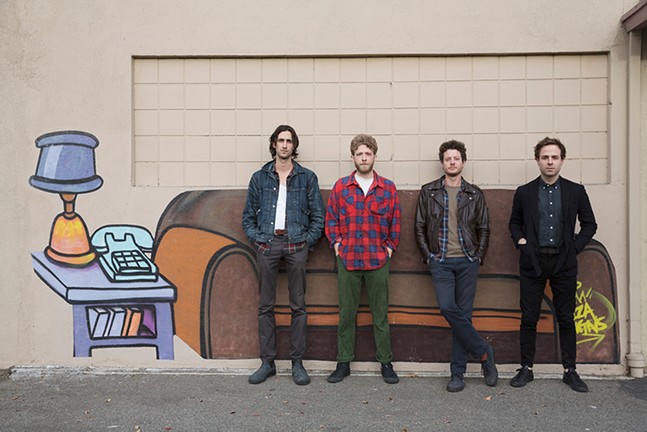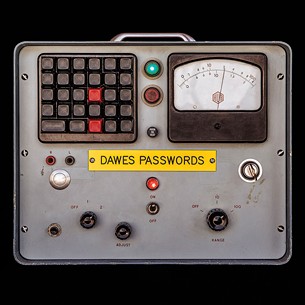Honesty isn’t something Taylor Goldsmith, lead singer and songwriter of the Southern California band, Dawes, takes lightly.
Two days before kicking off the North American An Evening With Dawes: Passwords Tour, Goldsmith set aside 15 minutes to discuss the upcoming tour and Dawes’ latest album, Passwords. While talking to Goldsmith, I was stuck with how raw his responses where. He oozed honestly through the phone and didn’t fall into the trap many artists tend to when interviewed, which is filling your ears with PR jargon. I left our conversation feeling like I got an intimate peek into the mind of Taylor Goldsmith.
The same can be said for Dawes’ sixth album, Passwords. This album is the first Dawes recorded purely for themselves, without critics and fans in mind.
“An Evening With Dawes” makes its fifth stop at Stage AE on Wed., Sept. 12.
Where did the name, “An Evening With Dawes” come from and why did you decide to not have an opener?
Whenever an artist does the kind of show where it’s just them, like Brandi Carlile or My Morning Jacket, and they’re not going to have
So as time was going on and we were bringing openers up, we just continued to make our set longer and longer and it just got to the point where it was like, "You know, it might be most successful for us if we just did two separate sets and played all night." Especially in the spirit of being able to get back on our feet. Sometimes we’ll be playing for an hour and a half or something and if there’s a lull or a bad solo, it can be kind of hard to recover. But when you’re playing for three hours or so, it allows you to really get back into it, like we never really had a bad show doing it this way. I mean there have been bad songs, or maybe even bad sets, but never bad full shows because there’s just too much time for us to have a special moment at some point.
How long have you been performing like this, with two full sets a night?
We started it on our last album, We’re All Gonna Die, so this is our second album cycle doing that.
Cool, so I’m guessing you prefer the longer sets then?
Yeah, it's definitely the most satisfying. And I think there’s a feeling that someone comes to a show to feel like the artist is leaving it all out there. Sometimes there are shows when you don’t get that feeling, and it's not a matter of time. I think Red Hot Chili Peppers play for like 80 minutes, or something like that, but they give it everything they have for the whole time. So, by the end, you feel like they really did it, that they took it all the way. For other artists, it is a matter of playing all those songs, like Bruce Springsteen plays for four hours. So, I don’t think it’s simply we’re playing three hours because that’s what it takes to put it all out there, but it is one ingredient of how-to for us. There are shows when we open for 45 minutes and it feels like that. Then there are shows where we play for three hours and it doesn’t feel like we’ve done it all yet. I think that’s kind of where it comes from.
You just had your album Passwords come out. When you do these longer sets, can attendees expect a focus on your newest release or will it be a mix of all your albums?
We definitely explore whatever the most recent record is probably the most, but because it’s a long show, you get a piece of everything. We touch on every album, try to really explore the whole catalog. There are some bands who get to that point in their career where they sort of feel like, "You know, I don’t feel represented by our first album anymore so I’m not going to play anything from it.” We’re lucky enough where we’ve never had to feel that way. We still love playing songs from our first album. That’s something we feel really grateful for. So yeah, with that length of show people can expect us to dive into all corners.
Do you have a pre-planned setlist or do you just go with the flow and see how you’re feeling that day?
There are certain cornerstones that end up working that we keep. Whether that’s the first song of the first set and the last song of the last set, but for the most part, we try to change it up. For the sake of ourselves really, first and foremost, to stay really engaged with it and not get too comfortable. But, by doing that we hope that it’s for the sake of the audience as well, where they can tell that we’re a band that is reacting to a moment and thinking on our feet and creating something that is existing in that moment rather than something we just rehash every day.
Although you switch it up, do you have a favorite song that you like to perform?
It definitely changes, because that’s how it is when you’re making new records and stuff, but right now I think my favorite song to play live would be “Feed The Fire,” which is off our new record. Just because
Speaking of your new album, Passwords, I read in an interview that you did with Rolling Stone that you made this album solely for yourselves. How did it feel creating an album with that "I don’t care attitude"?
It’s becoming clear to me, more and more, that that’s really the responsibility. It’s very easy to listen to the noise. If I put out a song that sounds like something I’ve never done before, ideally there’s going to be someone that says, “This is amazing,” and maybe someone that says, “This is crap.” It’s so easy to be pulled in both directions, but both can harmful. If there’s a lot of people getting in your ear about like, "Oh you should more of what you use to be” or “You should do something different because you have to,” I think both of those could be potentially harmful because then I would be doing it for the sake of maintaining some version of success or some version of pleasing others. I find that every artist, whether they're making movies or writing books or whatever, the more that they can get to a place where they are absolutely doing it for themselves, the audience perceives that, and appreciates that. And even if it's not for them, they can identify, “Oh this is someone that’s true to themselves,” and “I’m watching an honest experience right now.” I’m 33 now and I’m very grateful and proud of the records we’ve made, but I feel like Passwords more than any has been an opportunity for all of us to make sure we’re doing it for us and hope that people enjoy it. And if they don’t, then at least we are able to say that it means a lot to us and that we did it for the right reasons.
Your song, “Never Gonna Say Goodbye,” began as a private song between you and your fiancé Mandy Moore. How did you overcome that vulnerability and publish a song that gives others a glimpse into your relationship?
For better or worse, I’ve always been too willing to talk about things that maybe I shouldn’t. [laughs] I think there’s an aspect to any writer that’s a bit exploitative and voyeuristic, but within the confines of a song like “Never Gonna Say Goodbye,” I think that’s perfectly fine because it’s just trying to share with the world what a person means to me. Sometimes you hear these love songs from a writer to someone else, and then you really listen to the words and it seems to be about the person who wrote it, it seems to be about, "This is how I’m different now because of you. I’m this now and that now and this now.” It's very much about them, it’s not really getting into, “I want to talk about someone else.” Yes, I want to talk about what they do for me, but I also what to talk about their outlook on the world, and the perspective they have and their
You said you moved away from, “I feel this way and I feel that way” in your songs. Do you feel like Passwords in general veered away from this nihilistic attitude you had when you were younger?
I think that there’s an important period for any young songwriter. I definitely was an example of this with my early records, where, it feels perfectly fine to just talk about yourself for a 40-45-minute album, where you’re talking about your heartache and your loneliness, and how sad things can be. I think it’s not only typical, and that sounds like a negative way to put it, but I also think its edifying. It helps you. It helps you purge something. But, as you get older, if you’re stuck in that, then it becomes some weird feedback loop. The purpose of art, which is to help us grow and to help us recognize ourselves and to get to know ourselves, [is lost]. It becomes more of a device to get people coming to shows and buying albums, but it no longer represents the artistic process. I recognize that that will also be a part of what writing is, talking about yourself, but the way I look at it is like a conversation at a dinner table with someone you don’t know that well. I expect them to talk about themselves, but I also expect them to talk about me a little bit, or people that we both don’t know, or whatever’s going on in the news. I find that if you do sit down with someone and they talk about themselves for an hour, its like, “Wow, okay, you’re that kind of person.” So, it’s important to make sure that in my music, I’m able to talk about myself a bit, but that I’m also able to infer the question, “And how are you doing?”
Since we are talking in preparation for your show at Stage AE on Sept. 12, do you have any plans for your time in Pittsburgh?
A lot of the time, unless we have a couple days, it’s tough. When we’re on tour, I sleep all day to make sure I’m still wide awake when the show is over at 11 p.m. I don’t want to come off like I’m about to go to bed, so my schedule’s all turned around, but when I do have time, we try to find record stores or cool used bookstore, like a cool rare bookstore.
I recommended Taylor visit White Whale Bookstore.



